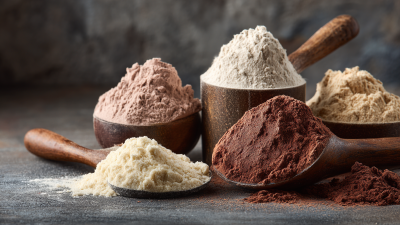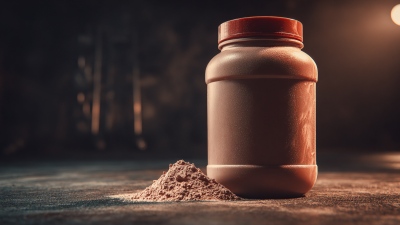In today's fast-paced world, optimizing performance through effective nutrition has become essential for athletes and fitness enthusiasts alike. One pivotal component that can significantly enhance your daily regimen is Amino Protein Powder. This powerful supplement is not just a trendy addition to your diet; it's a science-backed tool designed to support muscle recovery, boost energy levels, and improve overall performance.

However, the key to reaping its full benefits lies in knowing how to incorporate Amino Protein Powder effectively into your daily nutrition plan. In this blog, we will explore the top strategies to seamlessly integrate this potent powder into your meals and snacks, ensuring you achieve your fitness goals and maintain peak performance day in and day out.
Whether you're a seasoned athlete or just starting your fitness journey, understanding the best practices for using Amino Protein Powder will elevate your nutrition to new heights.
 Amino protein powder plays a vital role in muscle recovery, offering several research-backed benefits that can enhance athletic performance. One of the key advantages is its ability to reduce muscle soreness post-exercise. A study published in the Journal of the International Society of Sports Nutrition found that athletes supplementing with branched-chain amino acids (BCAAs) experienced a 33% reduction in muscle soreness compared to those who did not, allowing for quicker recovery and readiness for subsequent workouts.
Amino protein powder plays a vital role in muscle recovery, offering several research-backed benefits that can enhance athletic performance. One of the key advantages is its ability to reduce muscle soreness post-exercise. A study published in the Journal of the International Society of Sports Nutrition found that athletes supplementing with branched-chain amino acids (BCAAs) experienced a 33% reduction in muscle soreness compared to those who did not, allowing for quicker recovery and readiness for subsequent workouts.
Moreover, amino acids significantly contribute to muscle protein synthesis, which is crucial for rebuilding and strengthening muscles after stress. Research indicates that dietary protein containing essential amino acids can stimulate muscle protein synthesis by up to 50%, leading to improved muscle recovery and growth over time. Additionally, incorporating amino protein powder helps to prevent muscle breakdown. A meta-analysis in the American Journal of Clinical Nutrition reveals that regular intake can reduce muscle protein breakdown by approximately 31%, ensuring that athletes maintain their muscle mass even during rigorous training periods.
Integrating amino protein powder into daily nutrition not only accelerates recovery but also enhances overall performance, making it an essential supplement for those looking to optimize their training outcomes.
 When it comes to enhancing athletic performance, understanding the role of amino acids in your diet is crucial. Among the numerous amino acids available, three stand out: leucine, glutamine, and branched-chain amino acids (BCAAs). Leucine is particularly vital for muscle protein synthesis, acting as a signal to promote muscle growth and recovery post-exercise. Athletes should prioritize leucine intake, especially after workouts, to maximize the effectiveness of their training.
When it comes to enhancing athletic performance, understanding the role of amino acids in your diet is crucial. Among the numerous amino acids available, three stand out: leucine, glutamine, and branched-chain amino acids (BCAAs). Leucine is particularly vital for muscle protein synthesis, acting as a signal to promote muscle growth and recovery post-exercise. Athletes should prioritize leucine intake, especially after workouts, to maximize the effectiveness of their training.
Glutamine, another key player, supports both immune function and gut health, making it essential for athletes who push their limits. Intense training can deplete glutamine levels, so incorporating it as part of your daily nutrition can help maintain performance and reduce the risk of injury. Lastly, BCAAs, which include leucine, isoleucine, and valine, work synergistically to fuel your muscles and support recovery. They help reduce muscle soreness and fatigue, enabling athletes to train harder and longer.
By strategically incorporating these amino acids into your diet, you can significantly enhance your performance and recovery. Whether through amino protein powders or whole food sources, ensuring adequate intake of these critical building blocks is key to unlocking your athletic potential.
Incorporating amino protein powder into your daily nutrition can significantly enhance your athletic performance and recovery. Research indicates that dietary protein, including amino acids, is essential for muscle repair and growth. A study published in the "Journal of Nutrition" reveals that consuming protein shortly after exercise increases muscle protein synthesis rates by 25% to 50%. Here are five effective strategies for integrating amino protein powder into your smoothies and meals.
First, add a scoop of amino protein powder to your morning smoothie. Combine it with spinach, banana, and almond milk for a nutrient-dense breakfast that packs a punch. Not only does this combination boost your protein intake, but it also provides essential vitamins and minerals.
Tip: For a post-workout snack, blend amino protein powder with Greek yogurt and berries. This not only enhances flavor but also maximizes your intake of both protein and antioxidants, aiding recovery.
Lastly, consider mixing amino protein powder into soups or oatmeal. This seamless integration allows you to increase protein content without compromising taste. A weekly tracking of your protein intake can ensure you're meeting the recommended dietary allowance of 0.8 grams per kilogram of body weight, helping to support your overall fitness goals.
When it comes to optimizing muscle growth and performance, the timing of protein intake plays a crucial role. Recent research highlights that the anabolic response to protein ingestion is maximized when consumed in adequate amounts after exercise. Ingestion of 100 grams of protein was shown to produce a more significant and prolonged anabolic response, exceeding 12 hours, compared to just 25 grams. This implies that athletes aiming for muscle gain should focus on their post-workout nutrition to capitalize on this heightened responsiveness.
Tip: Consuming a protein shake immediately after your workout can significantly enhance muscle recovery. Aim for a protein intake that exceeds 30 grams to reap maximum benefits.
In addition to post-workout consumption, there are other optimal times for taking amino protein powder. For instance, many experts advocate for intake in the morning as a means to jumpstart metabolism and support muscle preservation throughout the day. Additionally, taking amino protein before resistance training can provide the body with essential nutrients to optimize performance during workouts.
Tip: Incorporating a serving of protein 30 minutes to an hour before exercising can help improve energy levels and enhance performance. This approach ensures your muscles are fueled appropriately before you begin your workout.
When it comes to amino protein powder, many misconceptions may cloud your understanding of its actual benefits and limitations. Among such myths, one common belief is that more protein always leads to better muscle gains. However, research has shown that the body can effectively utilize only a certain amount of protein at one time. Consuming beyond this capacity does not enhance absorption but can lead to unnecessary caloric intake.
Additionally, some people think that protein supplements are necessary for a well-rounded diet. Yet, a variety of high-protein vegetarian sources, including lentils, quinoa, and chickpeas, provide all the essential amino acids without the need for supplementation. Incorporating these whole foods into your meals can be an effective way to meet your nutritional needs without falling prey to the hype surrounding protein powders.
**Tips for Incorporation:** To enhance your dietary regimen, consider incorporating amino protein powder into smoothies or oatmeal instead of relying solely on supplements. This can enhance the flavor while ensuring you receive a balanced meal. Additionally, pair protein sources with carbohydrates and healthy fats to improve nutrient absorption and overall satisfaction. Always be mindful of the total protein intake from all sources throughout the day to prevent exceeding your body's absorption capabilities.
| Myth | Fact | Expert Evidence |
|---|---|---|
| Amino Protein Powder is only for bodybuilders | It's beneficial for anyone engaged in fitness or looking to maintain muscle mass. | Studies show that amino acids support muscle repair and synthesis for various athletes. |
| All amino protein powders are the same | Formulations vary; some have extra vitamins, minerals, or specific amino acid profiles for targeted benefits. | Nutritional experts highlight the importance of specific amino acid profiles for recovery. |
| Using amino protein powder could cause kidney damage | For healthy adults, moderate use of protein supplements does not harm kidney function. | Research indicates that increased protein intake is safe for individuals with normal kidney function. |
| Amino protein powder can replace whole food sources | It should complement whole foods, not replace them, for overall nutrition. | Experts recommend a balanced diet rich in whole foods for optimal health. |
| Higher protein intake inevitably leads to weight gain | Weight gain results from a caloric surplus, not just protein intake itself. | Data shows that balanced protein intake supports muscle without excessive fat gain. |






